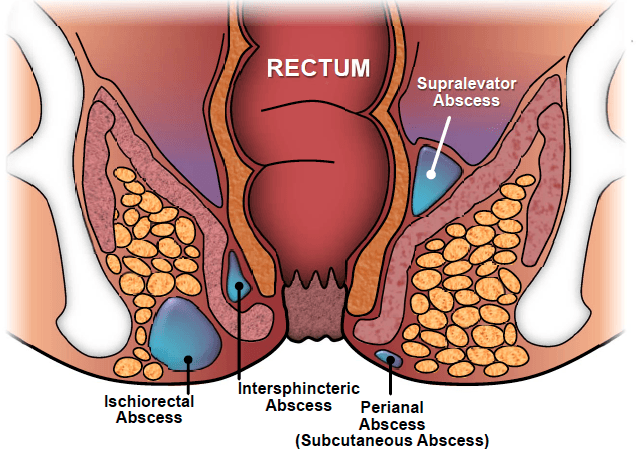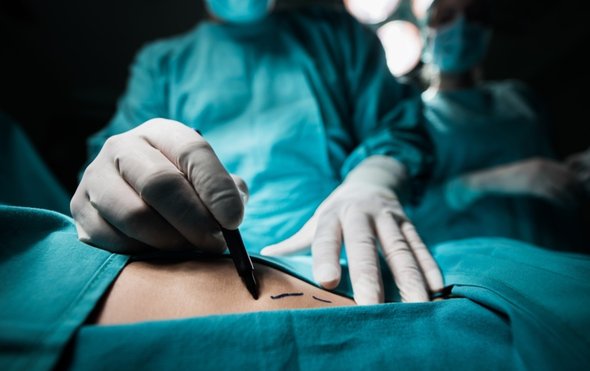Anal fistulas are caused by an infection of the anal glands – a small tunnel/tract forms between the end of the bowel and the skin next to the anus. Bacteria can cause a collection of abscesses to form when the pus from these drains away, a small channel is left behind.
Anal Fistula Surgery is often performed under general anesthetic and can take up to 30 mins. Depending on where the fistula is, the surgeon will determine how to approach the surgery – surgery may be performed over a few separate operations to reduce the risk of infection when passing bowel movements.

The Procedure
Contents
There are several different procedures to treat an anal fistula and the surgery will be performed by a colon or rectal surgeon. The goal of the surgery is to heal the fistula while avoiding damage to the sphincter muscles, which could result in loss of bowel control. Your surgeon will discuss the best option suitable for you. It usually depends on where the fistula is and whether it is a single channel or branches off in different directions. To help determine the best treatment for you, you may need to have an initial examination of the area. Anal fistula surgery is performed under local or general anesthetic.
- Fistulotomy is the most common type of surgery to treat an anal fistula. During this procedure, your surgeon will make an incision along the whole length of the fistula in order to open it up so it can heal as a flat scar. Although it is the most effective treatment for many anal fistulas, it is only suitable for fistulas that do not pass through much of the sphincter muscles. Sometimes, your surgeon may have to cut a small portion of anal sphincter muscles. When they do it, they will make an attempt to reduce the risk of incontinence. If the risk of incontinence is too high, your surgeon may recommend another procedure.
- Seton techniques are performed when your fistula passes through a significant portion of anal sphincter muscles. With this technique, your surgeon will insert a Seton. A Seton is a piece of surgical thread that is left in the fistula for several weeks to keep it open, which will allow it to drain and to help it heal without cutting the sphincter muscles. A loose Seton will allow the fistula to drain but will not cure it. To cure the fistula, your surgeon may use tighter Setons to cut through the fistula slowly.
- Advancement flap procedure may be considered by your surgeon if your fistula passes through anal sphincter muscles. During this procedure, your doctor will cut or scrape out the fistula. Then they will cover the hole where it entered the bowel with a flap of tissue taken from inside the rectum. However, this procedure has a lower success rate than a fistulotomy.
- LIFT procedure, or the ligation of the inter-sphincteric fistula tract, is a treatment for fistulas that pass through the anal sphincter muscles. Your surgeon will make a cut on the skin above the fistula to open it up and the sphincter muscles are moved apart. Then, the fistula is sealed at both ends and cut open so it lies flat. This is one of the newest procedures to treat an anal fistula.
Length of Stay in Destination
After the surgery, you should be able to go home on the same day or you will need to stay in the hospital for one night. However, you may need to stay in the area for 10 to 14 days, because you will need to allow some time for the initial recovery and to attend follow-up checkups.
Recovery Time
The recovery period may vary from patient to patient. Although superficial anal fistula can heal faster, it still will take several months for a full recovery. Within one or two hours after the surgery, your surgeon will encourage you to get up and walk around. However, you will need to rest for the first few days and walk as little as possible to help the wound to heal. Expect to pass feces within one to three days, which may feel uncomfortable at first and a small amount of bleeding is possible. You can take a painkiller around 20 minutes before going to the toilet to help with the uncomfortable feeling. The wounds should heal within six weeks. You may get back to work after a few weeks when you feel comfortable enough.
Aftercare
Your surgeon will likely give you advice and post-operative instructions. You will need to make sure that you follow the instructions strictly for a quicker recovery. You must keep the wound clean and dry so it can heal well. If your wound is bleeding, you can use a dressing or gauze pad over the wound. It might be helpful for you to use a sanitary pad to protect your clothes. To help ease the pain and keep your wound clean, you will be advised to have warm baths each day. However, do not add anything to the bathwater to avoid irritating the wound. Your surgeon may prescribe laxative medicine to help keep your stool soft so that it is less painful for you to go to the toilet.
Success Rate
The success rate of anal fistula surgery is extremely high. However, with any type of treatment and surgery, it carries a number of possible risks. Be sure you ask for more information regarding the risk and complication that may happen. Some of the risks for anal fistula surgery are:
- Infection. Can usually be treated by antibiotics, but severe cases may need to be treated in hospital.
- Recurrence of the fistula.
- Bowel incontinence and this is the most common potential risk, but severe incontinence is rare.
Alternatives to an Anal Fistula Surgery Procedure
An anal fistula cannot be treated without surgery because only very few anal fistulas heal by themselves. Without surgery, the symptoms may get worse. The only non-surgical option to treat anal fistula is fibrin glue, the surgeon injects special glue into the fistula. The glue helps seal the fistula and encourages it to heal.
For more detailed information on Anal Fistula, watch this short video.
To check prices or to book an Anal Fistula Surgery Procedures in Thailand or anywhere else in the world, head on over to MyMediTravel now!

